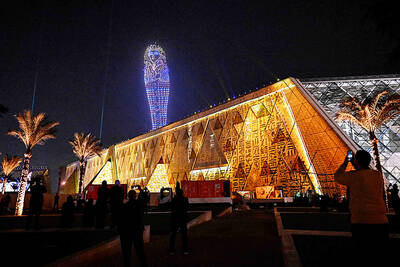Koran Indonesia looks deceptively like a normal newspaper, but is clearly slanted to make Indonesian President Megawati Sukarnoputri's government look good. "The economy has recovered," reads one headline, while another announces: "Farmers are getting wealthier."
The paper appeared on newsstands on the first day of campaigning for Indonesia's first direct presidential elections, and it comes as no surprise that it's funded by Megawati's campaign team.
It is one of the more innovative -- and some might say sneaky -- ways the five candidates contesting the July 5 polls are trying to win over Indonesia's 150 million voters.
For the first time in the country's history, candidates are fighting to get their message directly to the populace, spending millions on TV and radio commercials and full-page newspaper advertisements.
Previously, voters were bypassed in a system where lawmakers acting as an electoral college picked the president. The system, devised by former dictator Suharto, returned him to power six times until he was ousted in 1998.
Spreading the word about the candidates is not limited to the mass media. Campaign workers also hand out bars of soap, cooking oil, kites and wrist watches emblazoned with candidates' faces at rallies.
Banners bearing simple slogans hang from trees and lampposts and even from cemetery gates across the country.
The top three presidential hopefuls are said to have accumulated huge war chests, mostly in unregulated donations from by wealthy business people seeking favors from future administrations.
So far, Megawati's campaign has spent around US$480,000 on advertisements alone, according to a survey by anti-corruption watchdogs.
She is leading the spending rush -- both on conventional ads and on efforts like Koran Indonesia, which appear to circumvent Indonesia's weak campaign finance laws.
Readers of Koran Indonesian have to get to the fine print at the bottom of page two before they learn that Megawati's campaign team produces the paper.
The 300,000-circulation broadsheet is supposedly on sale for a small sum, but is actually distributed for free.

‘CHILD PORNOGRAPHY’: The doll on Shein’s Web site measure about 80cm in height, and it was holding a teddy bear in a photo published by a daily newspaper France’s anti-fraud unit on Saturday said it had reported Asian e-commerce giant Shein (希音) for selling what it described as “sex dolls with a childlike appearance.” The French Directorate General for Competition, Consumer Affairs and Fraud Control (DGCCRF) said in a statement that the “description and categorization” of the items on Shein’s Web site “make it difficult to doubt the child pornography nature of the content.” Shortly after the statement, Shein announced that the dolls in question had been withdrawn from its platform and that it had launched an internal inquiry. On its Web site, Le Parisien daily published a

China’s Shenzhou-20 crewed spacecraft has delayed its return mission to Earth after the vessel was possibly hit by tiny bits of space debris, the country’s human spaceflight agency said yesterday, an unusual situation that could disrupt the operation of the country’s space station Tiangong. An impact analysis and risk assessment are underway, the China Manned Space Agency (CMSA) said in a statement, without providing a new schedule for the return mission, which was originally set to land in northern China yesterday. The delay highlights the danger to space travel posed by increasing amounts of debris, such as discarded launch vehicles or vessel

RUBBER STAMP? The latest legislative session was the most productive in the number of bills passed, but critics attributed it to a lack of dissenting voices On their last day at work, Hong Kong’s lawmakers — the first batch chosen under Beijing’s mantra of “patriots administering Hong Kong” — posed for group pictures, celebrating a job well done after four years of opposition-free politics. However, despite their smiles, about one-third of the Legislative Council will not seek another term in next month’s election, with the self-described non-establishment figure Tik Chi-yuen (狄志遠) being among those bowing out. “It used to be that [the legislature] had the benefit of free expression... Now it is more uniform. There are multiple voices, but they are not diverse enough,” Tik said, comparing it

Prime ministers, presidents and royalty on Saturday descended on Cairo to attend the spectacle-laden inauguration of a sprawling new museum built near the pyramids to house one of the world’s richest collections of antiquities. The inauguration of the Grand Egyptian Museum, or GEM, marks the end of a two-decade construction effort hampered by the Arab Spring uprisings, the COVID-19 pandemic and wars in neighboring countries. “We’ve all dreamed of this project and whether it would really come true,” Egyptian Prime Minister Mostafa Madbouly told a news conference, calling the museum a “gift from Egypt to the whole world from a